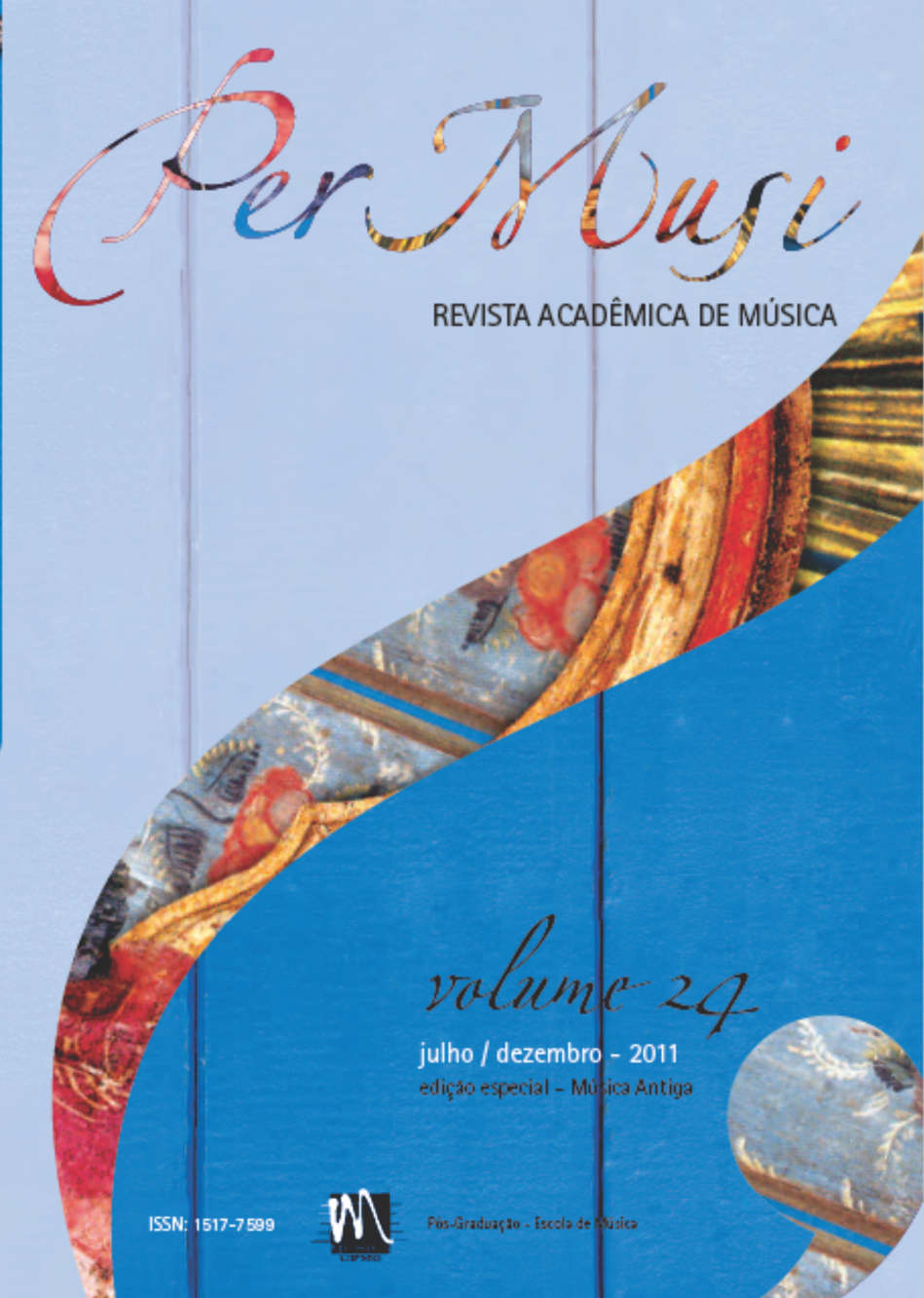A experiência barroca e a identidade local na Semana Santa de Campanha, Minas Gerais
Palavras-chave:
Barroco, Minas Gerais, Semana Santa, Participação, Identidade localResumo
Este trabalho analisa a formação de uma sensibilidade barroca em Minas Gerais a partir da orientação participativa e altamente emotiva das festas coloniais, cujo legado se mantem presente nas festas religiosas de muitas antigas cidades mineradoras do estado. Enfocando as celebrações da Semana Santa na cidade sul-mineira de Campanha, o texto mostra como este evento anual era organizado pela Irmandade do Santíssimo Sacramento, passando então às mãos de uma comissão local após a extinção da irmandade. Se até meados do século XIX, havia músicos semi-profissionais contratados para tocar e cantar nas celebrações, a música foi assumida progressivamente por grupos de amadores. Assim, a festa passou a ser entendida como uma produção local e a cada ano a população renova o seu orgulho campanhense, ao contemplar sua capacidade de produzir um evento tão ‘maravilhoso’.
Referências
ANDRADE, Marcos Ferreira de. Família, fortuna e poder no império do Brasil: Minas Gerais, Campanha da Princesa (1799-1850). Tese de doutorado, Universidade Federal Fluminense, 2005.
BORGES, Célia Maia. Escravos e libertos nas irmandades do rosário: devoção e solidariedade em Minas Gerais – séculos XVIII-XIX. Juiz de Fora: Editora da UFJF, 2005.
BOSCHI, Caio César. Os leigos e o poder: irmandades leigas e política colonizadora em Minas Gerais. São Paulo: Ática,1986.
BOURDIEU, Pierre. Esboço de uma teoria da prática. Precedido de três estudos de etnologia Kabila. Oeiras: Celta, [1972] 2002
______. A Distinção: crítica social do julgamento, Porto Alegre, Editora Zouk, [1979] 2007.
CASADEI, Thalita de Oliveira, e CASADEI, Antonio. Aspectos históricos da cidade da Campanha. Petrópolis: Editora Gráfica Jornal da Cidade, 1989
MELLO E SOUSA, Marina. Paraty: a cidade e as festas. Rio de Janeiro: Ouro sobre Azul, 2008.
MORAES, Hildegardo. Reminiscencias da Campanha. Minas do Sul, Anno 1, no. 3:2, 1935.
REIS, João José. A morte é uma festa: ritos fúnebres e revolta popular no Brasil do século XIX. São Paulo: Companhia das Letras, 1991.
SALLES, Fritz Teixeira de. Associações religiosas no ciclo do ouro: introdução ao estudo do comportamento social das irmandades de Minas no século XIII. São Paulo: Perspepectiva, 2007 [1963].
SKRINE, Peter N. The Baroque: Literature and Culture in Seventeenth-Century Europe. Cambridge: Methuen & Co, 1978.
STOCKSTAD, Marilyn. Art History. Saddle River: Prentice Hall, 2002.
LEFORT, José do Patrocínio. Músicos da Campanha. Campanha: Voz diocesana, No. 915, Ano 29:3, 1976.
VALLADÃO, Alfredo. Campanha da Princesa, Volume 2 (1821–1909). Rio de Janeiro: Leuzinger, 1940.
TONI, Flávia Camargo. A música nas Irmandades da Vila de São José e o Capitão Manoel Dias de Oliveira. Dissertação de mestrado, University of São Paulo, 1985.
Downloads
Publicado
Edição
Seção
Licença

Este trabalho está licenciado sob uma licença Creative Commons Attribution 4.0 International License.

Exceto onde está indicado, o conteúdo neste site está sob uma Licença Creative Commons - Atribuição 4.0 Internacional.












